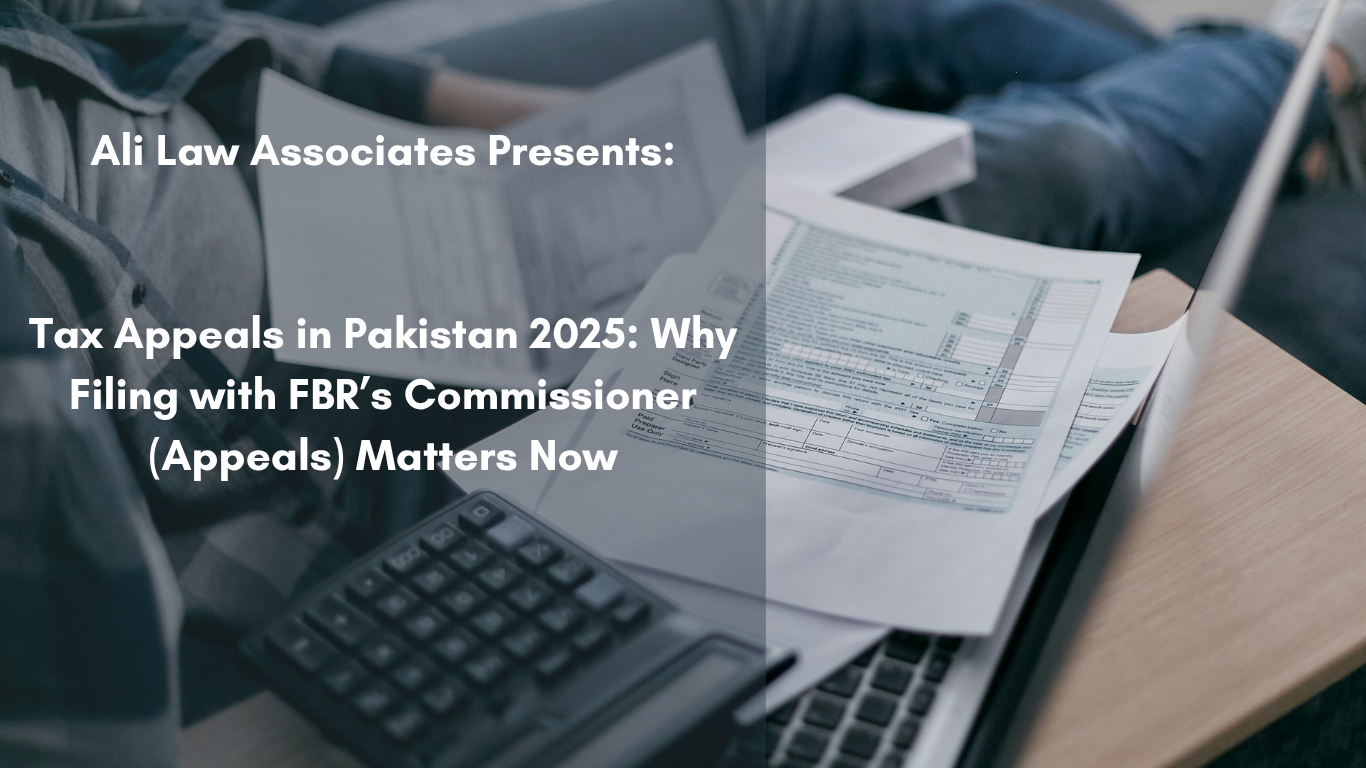Why Filing with the Commissioner (Appeals) Matters More Than Ever
Tax Appeals in Pakistan 2025 | If you’ve ever disagreed with an assessment or notice from Pakistan’s Federal Board of Revenue (FBR), you know how intimidating the appeal process can be. In 2025, the rules have changed — again — and the stakes are higher than ever.
The Finance Act 2025 has restored the two-tier appellate framework, making the Commissioner (Appeals) your first and most critical stop before you can take your case higher. But here’s the twist — while you’re appealing, the FBR can now recover the disputed tax in certain cases.
In this guide, we’ll break down the new appeal system, what’s changed in 2025, and how you can protect your rights (and your bank account) by acting quickly and strategically.
1. The 2025 Game-Changer: Restoration of the Two-Tier Appeal System
Starting July 1, 2025, the government rolled back the controversial 2024 amendment that had sent tax cases straight to the High Courts. That “shortcut” may have seemed efficient, but in reality, it overloaded courts and slowed down justice.
Now, the old but more balanced system is back:
- First Stop: Commissioner (Appeals) – Your initial opportunity to challenge the assessment, present evidence, and raise procedural or factual objections.
- Next: Appellate Tribunal Inland Revenue (ATIR) – A higher forum for reviewing the Commissioner’s decision.
- Final Step: High Court – Only through a tax reference after exhausting the first two stages.
Why it matters:
This gives you more opportunities to defend your case, but it also means missing the Commissioner (Appeals) stage will kill your appellate rights.
2. FBR’s Expanded Recovery Powers: Appeals Won’t Freeze Action Anymore
The Tax Laws (Amendment) Ordinance 2025, enacted on May 2, gave the FBR sweeping authority to recover tax even while your appeal is pending — if a similar issue has already been decided by the High Court or Supreme Court.
They can now:
- Attach bank accounts without notice
- Seal business premises
- Monitor business activities until recovery is made
This is a major shift from the earlier system where recovery was usually stayed during appeals. It means taxpayers can no longer rely on appeals as an automatic shield against FBR’s recovery actions.
3. Why the Commissioner (Appeals) Stage Is Your Strongest Defense
Here’s the reality:
If you skip the Commissioner (Appeals) or file carelessly, you lose the ability to fight your case effectively later.
This stage allows you to:
- Control how your dispute is framed legally
- Bring in both procedural and factual arguments
- Build a record that will be critical in the tribunal and higher courts
Think of it as laying the foundation of your case — if it’s weak, the whole structure collapses.
4. The Bigger Picture: A Legal System Under Pressure
Pakistan faces over 70,000 tax-related appeals each year, with fewer than 10 million registered income tax filers. Unlike other countries where very few appeals reach final courts, our High Courts are clogged with cases that should have been resolved at lower levels.
Tribunals often suffer from:
- Weak or inconsistent reasoning in decisions
- Delays in hearing and resolving cases
- Shortage of qualified members
This is why getting it right at the Commissioner (Appeals) level is so critical — you can potentially end your dispute earlier and save years of litigation.
5. Why You Need a Lawyer for FBR Appeals in 2025
With tight deadlines (90 days for ATIR decisions, extendable to 180) and FBR’s instant recovery powers, legal expertise is no longer optional.
A good tax lawyer will:
- Draft precise and well-reasoned legal arguments
- Ensure compliance with all procedural requirements
- File within strict timelines
- Shield your rights from aggressive recovery actions
Step-by-Step Appeal Process – Commissioner (Appeals)
Here’s your appeal roadmap under the 2025 rules:
| Step | What You Need to Do |
|---|---|
| 1. Obtain Assessment Order | Get the official order or notice from FBR. |
| 2. Prepare Power of Attorney | Authorize your lawyer to represent you. |
| 3. Gather Evidence | Audit records, bank statements, contracts, correspondence. |
| 4. Draft Appeal | Legal points, factual disputes, relief sought. |
| 5. File Within Deadline | Avoid penalties and protect against instant recovery. |
Documents Required for Filing an Appeal
| Document | Purpose |
|---|---|
| Assessment Order / Notice | Basis of dispute issued by FBR |
| Power of Attorney | Authorizes your legal representative |
| Supporting Documents | Audit records, financial statements, correspondence |
| Legal Opinion | Summarises disputed points and legal grounds for appeal |
Bottom Line: Act Fast, Act Smart
In 2025, the restored appeal process gives taxpayers more opportunity to be heard — but the FBR’s new recovery powers mean you must act immediately to prevent financial damage.
The Commissioner (Appeals) is not just a procedural stop — it’s your first line of defense and often your best chance at resolving disputes before they spiral into years of litigation.
At Ali Law Associates, we prepare and file strong, evidence-backed appeals within 6–9 working days — giving you the highest possible chance of success under the new rules.
📞 Need to File an Appeal? Call us now: +92 30 9004167
📍 Office: Lahore — Serving Clients Nationwide
🌐 Website: www.alilawassociates.com


